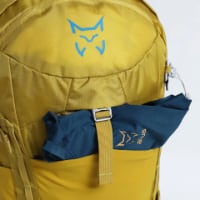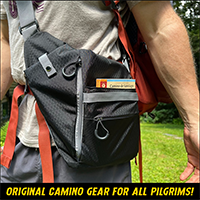- Time of past OR future Camino
- 1989, 2016, 2018, 2023, 2024...
I'm starting to think about organizing a Camino de Santiago Unconference.
"What is an unconference?", you ask. An unconference is a participant-driven event. Instead of having conference organizers decide the topics of discussion, arrange for speakers, and have the participants come and listen, in an unconference the people attending choose the topics and do the talking. The organizers provide the framework and organization. Generally, it looks something like this: There is a grid of times and places. People propose topics of discussion related to the theme of the event (in the case, the Camino de Santiago). In making a proposal they agree to facilitate a discussion on that topic at a time and place in that grid. Note that this is different from giving a talk. The talking is done by those that show up to that session. People can go from discussion group to discussion group and listen or participate. The rule is that if you are not participating or learning, you move on to a different topic discussion. It's like those conversations in the halls at regular conferences, but on steroids. Traditionally, unconferences are in-person events but in the last few years we are seeing more of them online, using the virtual meeting technologies that came to the fore with the pandemic.
I expect that it would look something like this:
Over summer, early fall, a some of us get together to organize. Prepare communications, etc. Maybe come up with a few icebreaker activities that can be done virtually. Maybe solicit a handful of Lightning Talks (3 minutes, no slides) for the start to get people energized and warmed up. Maybe we will solicit volunteers to take notes of the discussions, or maybe we will decide to record them, or maybe we will leave it up to the individual session facilitators (some topics may get personal and people won't want to be recorded).
- Sometime in the early fall, registration would open up and people can register to attend
- a few weeks before the event, we look at how many people have registered and determine how many simultaneous discussion spaces we want. I'm thinking about one per ten attendees we expect. Then we can create the grid as a Google Doc or Sheet. Each cell gets a Google Meet link (unless we come up with a better technology). In general, I've found 45 minute sessions work fairly well, with 5 minutes between, but I'm open to discussion on this. That would enable about 5 different time slots.
- Google meet links are also made for plenary sessions (with everyone) at the beginning and end.
- A week or two before the event, this is shared with the registered participants for them to propose topics in particular time slots. The grid is filled.
- On the day of the event, it starts with an introduction and welcome, a bit about what an unconference is, and the rules of the event. Perhaps a warm up activity or two and a handful of 3 minute lightning talks. Then we are into the sessions as determined by the grid. People who have sessions in the grid will facilitate a discussion at the virtual meeting link in their cell in the grid.
- At the end of the event, we gather together again for a close out and thank yous. One thing that has worked well is for each person to share one thing they learned at the event.
I was going to aim for November for this, but I think I'll be walking the Camino Torres and the Geira e dos Arrieiras in November so now I am thinking first half of December,
I've organized or helped in the organization of several unconferences, including one virtual one. This will be my first on a global scale, though.
If anyone would like to participate in organizing this event, please let me know.
"What is an unconference?", you ask. An unconference is a participant-driven event. Instead of having conference organizers decide the topics of discussion, arrange for speakers, and have the participants come and listen, in an unconference the people attending choose the topics and do the talking. The organizers provide the framework and organization. Generally, it looks something like this: There is a grid of times and places. People propose topics of discussion related to the theme of the event (in the case, the Camino de Santiago). In making a proposal they agree to facilitate a discussion on that topic at a time and place in that grid. Note that this is different from giving a talk. The talking is done by those that show up to that session. People can go from discussion group to discussion group and listen or participate. The rule is that if you are not participating or learning, you move on to a different topic discussion. It's like those conversations in the halls at regular conferences, but on steroids. Traditionally, unconferences are in-person events but in the last few years we are seeing more of them online, using the virtual meeting technologies that came to the fore with the pandemic.
I expect that it would look something like this:
Over summer, early fall, a some of us get together to organize. Prepare communications, etc. Maybe come up with a few icebreaker activities that can be done virtually. Maybe solicit a handful of Lightning Talks (3 minutes, no slides) for the start to get people energized and warmed up. Maybe we will solicit volunteers to take notes of the discussions, or maybe we will decide to record them, or maybe we will leave it up to the individual session facilitators (some topics may get personal and people won't want to be recorded).
- Sometime in the early fall, registration would open up and people can register to attend
- a few weeks before the event, we look at how many people have registered and determine how many simultaneous discussion spaces we want. I'm thinking about one per ten attendees we expect. Then we can create the grid as a Google Doc or Sheet. Each cell gets a Google Meet link (unless we come up with a better technology). In general, I've found 45 minute sessions work fairly well, with 5 minutes between, but I'm open to discussion on this. That would enable about 5 different time slots.
- Google meet links are also made for plenary sessions (with everyone) at the beginning and end.
- A week or two before the event, this is shared with the registered participants for them to propose topics in particular time slots. The grid is filled.
- On the day of the event, it starts with an introduction and welcome, a bit about what an unconference is, and the rules of the event. Perhaps a warm up activity or two and a handful of 3 minute lightning talks. Then we are into the sessions as determined by the grid. People who have sessions in the grid will facilitate a discussion at the virtual meeting link in their cell in the grid.
- At the end of the event, we gather together again for a close out and thank yous. One thing that has worked well is for each person to share one thing they learned at the event.
I was going to aim for November for this, but I think I'll be walking the Camino Torres and the Geira e dos Arrieiras in November so now I am thinking first half of December,
I've organized or helped in the organization of several unconferences, including one virtual one. This will be my first on a global scale, though.
If anyone would like to participate in organizing this event, please let me know.
Last edited:












